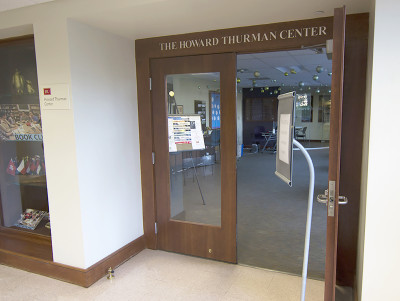
Boston University President Robert Brown reinforced BU’s commitment to diversity and announced in a Wednesday email to the student body the possibility of expanding the Howard Thurman Center for Common Ground.
Recent student activism around the nation on issues of race and inclusion are a reminder of critical challenges that demand a solution, Brown stated in Wednesday’s email to students.
The university commits to sustaining the faculty’s racial and ethnic diversity, building a student body that represents national and international diversity, fostering a respectful community and developing the first University-wide General Education Program that includes a focus on “understanding diversity,” the email stated.
Brown said the matter is an extensive and sensitive issue that needs to be addressed accordingly.
“As a university, we have a special obligation to take on difficult and complex challenges. The creation of a community that recognizes and respects all of our students, faculty, and staff is no exception to this obligation,” Brown wrote in the email.
The issue of diversity, however, is not an isolated incident but rather a recurring conversation at college campuses across the United States, said Stephen Brady, co-chair of the Task Force on Faculty Diversity and Inclusion.
“Many of the colleges we’ve talked to had a task force around these efforts and I wouldn’t say that we’re ahead or behind of the curve in terms of establishing them,” Brady, a professor in the School of Medicine, said.
The BU diversity and inclusion task force is still in its early stages of gathering data and translating community feedback into an effective plan, Brady said.
“There will be a report on where BU stands with recruitment of underrepresented minority faculty and students and where BU stands with inclusiveness for faculty and creating an inclusive climate,” Brady said. “We’re doing a bunch of things right to get as much information as we can to come up with the interim plan.”
Brown and Dean of Students Kenneth Elmore have also formed a committee of students, staff and faculty to expand the visibility of the HTC and achieve a respectful and inclusive community, Brown stated in the email. The committee is comprised of students representing various groups on campus such as Umoja, BU’s Black Student Union, and Students of Caribbean Ancestry, among others.
Micayla LeLugas, co-liaison to the Board for the Center for Gender, Sexuality and Activism and member of the committee, said she has witnessed a lack of diversity at BU.
“I’m from New Mexico and I haven’t had a lot of exposure outside of New Mexico and [students in the] colleges there are primarily Latino as is the state itself,” LeLugas, a senior in the College of Arts and Sciences, said. “When I came here, I was personally in shock just that there was such a small Latino community and such little diversity.”
Shari Tumandao, an administrative assistant at the HTC and a BU alumna in the class of 2014, said her outlook changed as a staff member.
“As a student, I did feel that there was a lack of diversity … but I know as an administrator, I’ve met a more diverse set of faculty and administrators than I hadn’t been exposed to as a student,” she says.
The lack of diversity could interfere with the relationship between professors and students, she added. Tumandao described how in her classes, insensitive comments came up and put both the student and professor in an uncomfortable situation.
“I was often in public health classes where healthcare would come up and I could be the only student of Hispanic origin in the room and all of a sudden someone makes an ignorant Mexican statement not about me but referring to Mexicans as the problem in our healthcare system,” she said. “The students of minority descent don’t know how to feel because you don’t feel represented or you don’t feel advocated for.”
Several students said the topic of diversity, racial inclusion and tolerance has been addressed accordingly at BU.
Justin Cipriano, a sophomore in the School of Hospitality Administration, said not only does he find rich cultural diversity on campus, especially among international students, but that he has also found an understanding community.
“My brother is gay and he actually looked into coming here and he said he felt very comfortable,” Cipriano said. “He saw that there was actually support [at BU] so I think they have some presence here in a positive way.”
Sophia Xiong, a senior in CAS, said although she had been predominantly taught by professors of the same race, she does not see it to be problematic.
“I’ve had semesters where a majority of my professors were white males but they were always so accepting because they never acted like they were our superior,” Xiong said. “It never seemed like an issue.”
Sabrina Sanders, a sophomore in the Questrom School of Business, said BU has a very diverse faculty compared to the University of Missouri, for example.
“Two of my best friends go to Missouri and it’s clear that there’s something off [at Mizzou] but it’s not as if our whole school is in turmoil and I think that’s the impression,” Sanders said. “[My friend] did say that there was definitely an issue to be addressed. He’s just not sure it’s being addressed in the right way. At BU, you wouldn’t think there was a problem.”





Conservative faculty are underrepresented. Will they be increased?